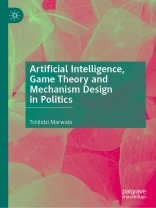This book explores how AI and mechanism design can provide a new framework for international politics. The international political system is all manners in which countries, governments and people relate. Mechanism design in international politics relates to identifying rules that define relationships between people and countries that achieve a particular outcome, e.g., peace or more trade or democracy or economic development. Artificial intelligence is technique of making machines intelligent. This book explores mechanism design and artificial intelligence in international politics and applies these technologies to politics, economy and society. This book will be of interest to scholars of international relations, politics, sustainable development, and artificial intelligence.
表中的内容
Chapter 1: Introduction to Artificial Intelligence, Game Theory and Mechanism Design in Politics.- Chapter 2: Game Theory in Politics.- Chapter 3: Mechanism Design in Politics.- Chapter 4: Artificial Intelligence in Politics.- Chapter 5: Data in Politics.- Chapter 6: Deep Learning in Politics.- Chapter 7: Natural Language Processing in Politics.- Chapter 8: Evolutionary Programming in Politics.- Chapter 9: Cybersecurity and International Politics.- Chapter 10: Social Media in Politics.- Chapter 11: Robotics in Politics.-Chapter 12: AI-Powered Blockchain in Politics.- Chapter 13: Conclusions.
关于作者
Tshilidzi Marwala is the Rector of the United Nations (UN) University and UN Under-Secretary-General. He was the Vice-Chancellor and Principal of the University of Johannesburg. Marwala was born at Duthuni Village in the Limpopo Province of South Africa. He obtained a Ph D in artificial intelligence from the University of Cambridge in 2000 and a Bachelor of Science in mechanical engineering from Case Western Reserve University, graduating with a Magna Cum Laude in 1995.












